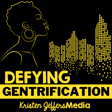
Reflecting on Atlanta and Baltimore Gentrification and Community Development with Derek Moore
This week on Defying Gentrification, I, your host Kristen Jeffers, talks to our first guest, Derek Moore, who came by to talk about their experiences with land use and gentrification. Stay tuned to the end to hear what I did after having this conversation! Plus our hot topic this week is how the remaining residents of Chinatown who are Chinese have to take a long bus ride to a grocery store that truly services them. I recorded that part at a store that serves the same role for me and reflect a bit on how that’s affected me over the years, as well as issue a call-to-action for the news site that it came from, as I usually do.
About our guest!
Derek Moore (he/they) is a Central West Baltimore-based Urban Planner and Non-Profit Development professional. He grew up in an Army family and has since lived in many cities across North America. Derek is a transportation advocate - co-founder of local urbanist group Friends of the Underground, Greening chair of Madison Park Improvement Association, and City and Regional Planning master’s student at Morgan State University.
Our hot topic reference article for this week — https://wamu.org/story/24/04/16/dc-chinatown-chinese-residents-leave-city-grocery-shop/
The WAMU takedown that I somewhat reference — https://www.washingtonian.com/2024/04/19/why-did-wamu-close-dcist/
An analysis and webinar on the lack of grocery stores in Black neighborhoods, focused on the Washington region (DMV) — https://ggwash.org/view/89226/premium-grocery-stores-are-missing-from-the-regions-high-income-black-neighborhoods
Learn more about Eden Center — https://edencenter.com/stores/
(Note, they do NOT have an H Mart, but there is one nearby in Fairfax County, VA)
Purchase from Kristen's Bookshop.org store and support the podcast!
Never miss an episode, subscribe to our Substack or on LinkedIn
You can also find Kristen @blackurbanist or @kristpattern.

